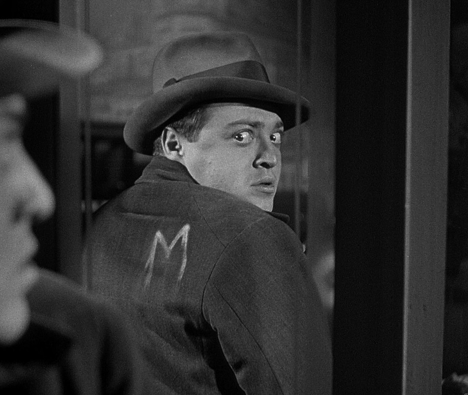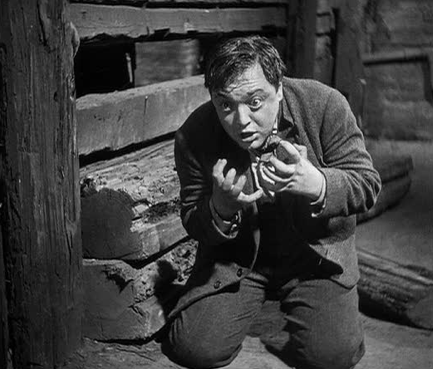Before Fritz Lang died, he had established himself as the titan of German Expressionist cinema, and he often referred to this week’s movie recommendation, M (1931), as his masterpiece.
 The film deals with the murderous impulses of Hans Beckert, played so well by Peter Lorre that he would reprise a similar character in many of his later films. Beckert is feeble and ashamed, and despite his awareness of the reprehensibility of his actions, he is unable to restrain himself. Beckert’s drive to kill children, however, is less of a focus in the film as is the community’s response engendered by his actions. In increasing desperation, the community turns from reliance on law enforcement to the organised crime underworld in an effort to apprehend Beckert by any means necessary. In so doing, they reveal their own pathetic susceptibility to bend rules for convenience’s sake.
The film deals with the murderous impulses of Hans Beckert, played so well by Peter Lorre that he would reprise a similar character in many of his later films. Beckert is feeble and ashamed, and despite his awareness of the reprehensibility of his actions, he is unable to restrain himself. Beckert’s drive to kill children, however, is less of a focus in the film as is the community’s response engendered by his actions. In increasing desperation, the community turns from reliance on law enforcement to the organised crime underworld in an effort to apprehend Beckert by any means necessary. In so doing, they reveal their own pathetic susceptibility to bend rules for convenience’s sake.
The final scene is one of the most iconic in cinema history, as Beckert is brought before a kangaroo court. The prescience of that scene in particular, in light of events that would unfurl shortly after the film’s release, is uncanny. The judge, wearing a long black leather coat redolent of the SS uniform, presides over the perfunctory trial of a Jew whose fate has long been decided. The procedural rules of the trial are improvised ad hoc to satisfy the braying of the crowd; moreover, the defence counsel is as useful as a mantelpiece ornament, and noncommittal to boot.
M takes us back to the dawn of ‘talkie’ films. In it, Lang capitalised on the novel addition of sound to the medium, varying between quiet scenes and loud cacophonies of dissonant music, narration, sound effects, and evocative whistling in quick succession of one another. Lang was a master of symbolism, and deployed all the tools at his disposal to maximal effect. His tricks have been reproduced in countless films since, almost identically.
- Like Kubrick’s The Shining (1980), the scenery in M is architecturally impossible, as is the lighting and use of shadow. Each contributes to the acute sense of claustrophobia and disorientation.
- Like Scorsese’s The Departed (2006), Lang illustrates the frailty of the distinction between good and evil by juxtaposing scenes of law enforcement with those of criminals, each of which is going about their respective business in similar fashion.
- Like Leone’s Once Upon a Time in the West (1968; reviewed here), Lang assigned the protagonist a jarring leitmotif (Grieg’s ‘In the Hall of the Mountain King’). The childlike cadences of the music disconcert audience members in light of the terrifying impulses towards children that they portend.
…The list could go on.
Not long after M’s release, both Lang and Lorre went into self-imposed exile in the States. Lang’s reasoning traces itself to a meeting with Goebbels, arranged shortly after the release of M. As a consequence of the film’s enormous success, Goebbels invited Lang to steer the newly-formed Nazi film industry. In response, he left the country. Lorre’s exile was accompanied with a little more flair: before leaving the country, he wrote a letter to Goebbels stating that ‘there isn’t enough space in Germany for two child-murderers like Hitler and Beckert.’
In 1936, while in the States, Lang made a lesser-known companion film to M, entitled Fury, which expanded on his preoccupation with ochlocracy that he first introduced in M. The parallels between the two films are too close not to dwell on at least momentarily: in both films, the protagonist is accused of kidnapping and murdering a young girl, and in both films, the citizens are whipped up into a frenzy in their pursuit of someone – anyone – to account for the crime. However, while in M the protagonist is indeed guilty, in Fury the protagonist is innocent. The distinction proves horrifyingly irrelevant, as the final message of both films is how ineffectual the justice system can be when set against a community’s retributive appetite. Perhaps as a showcase to Lang’s disenchantment with both notions of justice and of populism engendered by his personal experiences in Germany, the result in both films is eerily similar.
If we are to read anything into Lang’s filmography, he was a profoundly embittered man. Themes of revenge, oppression, aberration, credulity, and misogyny animate almost all of his films. However, bleak as they are, few directors have captured them on screen as successfully and evocatively as did Lang.
I managed to find an open source version of M at this link, but it doesn’t have subtitles. If you have better luck, please do let the rest of the RBC know in the comments section.
